#Workers Party
Text
GENERAL STRIKE TIME BABEY. READ THE WHOLE POST.
While we're all mad at government sending money to Israel that police budgets are so inflated because of how often they pay settlements.
And also that it's a verified fact that our police train with Israeli soldiers. Remember when they were black bagging people in PDX? It reminded me of this ex-Israeli soldier talking about how they'd do the same thing to innocent Palestinians just to terrorize them and their neighbors. It was intentional terrorism when they did it.
Police budgets pay for all that.
Correction, we pay.
To put it more bluntly,
We pay for them to kill and terrorize people.
Just as our taxes pay for the deaths of Black and Brown people all over the world from Turtle Island to Sudan and Palestine.
In Dec. 2022, Louisville Metro Government agreed to pay Walker $2 million to settle lawsuits against the city. Metro government previously paid a $12 million settlement to Taylor’s family in Sept. 2020
We paid for Breonna Taylor's death.
And her murderers were never arrested btw. Not that there aren't still people trying to arrest them of course. But our money paid for their lawyers and wouldn't you know it, no charges have stuck.
Four years to the day after Breonna Taylor’s death, federal prosecutors are moving forward with a re-trial of one of the officers involved in the botched raid that ended her life.
At a status conference Wednesday, U.S. District Court Judge Rebecca Grady Jennings scheduled Brett Hankison’s final pre-trial hearing for September 13th. His re-trial is scheduled to begin on Oct. 15.
In November of last year, Hankinson was tried for violating the Constitutional rights of Breonna Taylor, her boyfriend, and three neighbors when he fired through two covered windows during the raid.
Prosecutors argued he used excessive force when he shot into the apartment complex blindly. Taylor’s boyfriend, Kenneth Walker, had fired at officers executing the search, claiming he thought they were intruders.
And Myles Cosgrove?
Yeah we're paying him to terrorize more people. He got a job as a fucking sheriff's deputy.
Myles Cosgrove, the former Louisville police officer, who was fired for fatally shooting Breonna Taylor in a botched 2020 police raid and hired earlier this year as a sheriff’s deputy in Carroll County, rammed a resident’s truck with his cruiser Monday and then pointed a gun at the owner and several bystanders, witnesses said.
Witnesses told The Courier Journal that Cosgrove barreled into Happy Hollow Private Resort Park trailer park at a high rate of speed without his emergency lights on, then struck William Joshua Short’s pickup truck with such force that it sent the vehicle flying into a building, breaking off two cinder blocks.
And Johnathan Mattingly wrote a fucking book about it to make money off of his role in her murder. $15 on Amazon.
He also wanted to sue Kenneth Walker, Breonna's boyfriend. You know why? For damages and injuries he sustained while killing Breonna Taylor.
WE PAID FOR ALL THAT. ALL OF IT.
Our power is in our dollar.
American politics and officials don't care for our lives. It's why they're content to watch us protest for months. Because we're still going to work. We are the worker ants simply fulfilling our duty, receiving the bare minimum to survive for our labor.
We're still building their bombs. Paying our taxes, so much that hardly any of us could afford more than rent.
We are just drones fulfilling our purpose to the upper class who doesn't give a shit about us beyond what we do for them and how little we will do it for.
If we want change we're gonna have to stop working. We're going to have to deprive them of products they sell, of our taxes, of our low cost labor.
And the strike that UAW is planning in May 2028 has inspired a lot of others to start looking at the opportunity to join in.
If you haven't heard of it yet, a strike is when workers organize and stop showing up for work. And a general strike is a mass strike across various industries around similar demands or bargaining positions.
There have been multiple calls for a general strike since then, predominantly from individuals and groups on social media, which has often resulted in confusion about what a general strike would actually look like. To be clear, a general strike is not a protest or a rally, a single picket line, or a boycott. It is, as I’ve previously defined, “a labor action in which a significant number of workers from a number of different industries who comprise a majority of the total labor force within a particular city, region, or country come together to take collective action.”
Throughout history, workers have used this tactic as a nuclear option to shut down entire cities when needed, including Philadelphia in 1835, Seattle in 1919, and beyond.[...]
If even four or five of the unions representing the workers mentioned above banded together in a nationwide general strike, the entire country would grind to a halt. When Shawn Fain asks his fellow unions to set the timer for May 2028, what he’s really saying is, get ready to shut sh*t down and level the playing field between bosses and workers once and for all.
JOIN A UNION. AND TALK ABOUT THIS.
And make one of the demands out to be an end of American support to countries participating in apartheid and genocide.
End the taxes for police budgets and settlements. If they want police departments so bad then they should FIND funding for themselves like the government makes USPS do.
One of the biggest pushbacks we hear is that there is never any official backing for calls to a general strike. Well here it is! Make sure you tell EVERYONE
This could be a global strike if other countries choose to participate on the same date
No, I don't think Palestine has 3 years so in the mean time join a union, keep protesting, start rioting, answer Every call to action coming from a Palestine and Sudan and the DRC and sign this strike card
#workers rights#workers party#general strike#strike#leftist#communist#anarchist#end the occupation#end the genocide#abolish the police#class war#no war but class war#2028#UAW strike#united auto workers#may 2028#may day#solidarity#classism#capitalism#biden#current events#new
130 notes
·
View notes
Text
Belgians for Palestine 🇵🇸🇧🇪
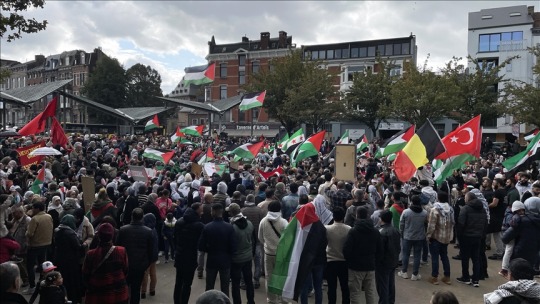
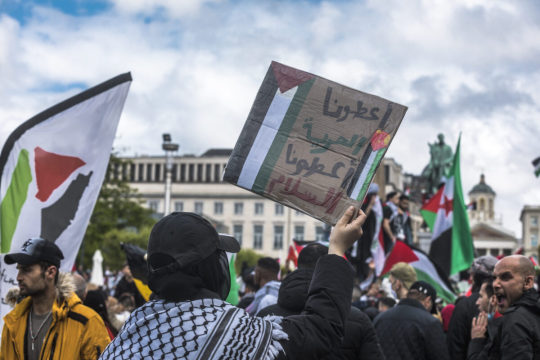
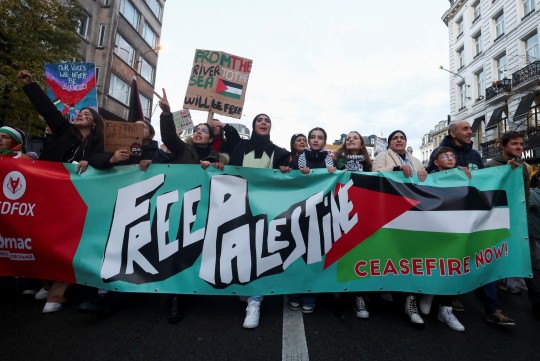
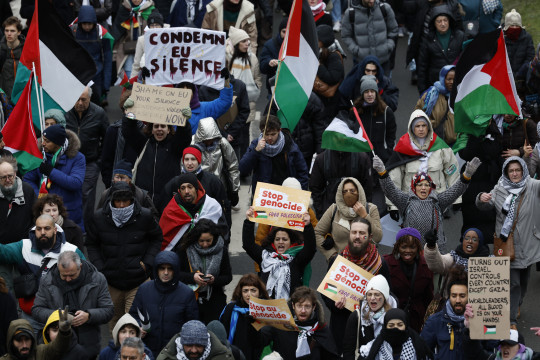
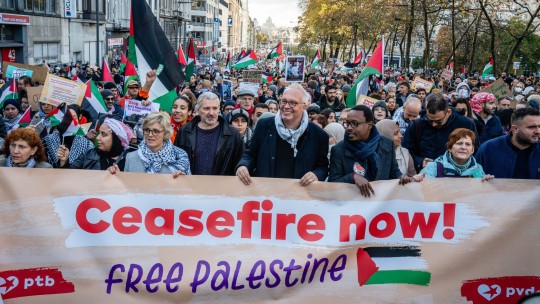
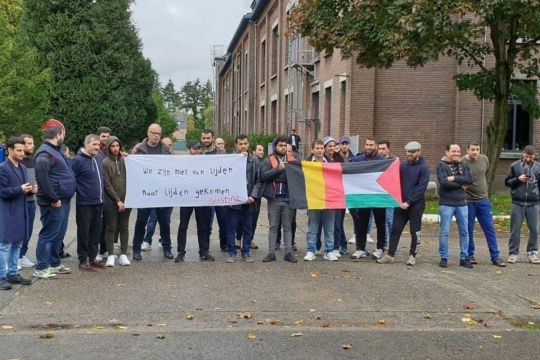
14 notes
·
View notes
Photo

263 notes
·
View notes
Text
The formation of the Palestinian state is a starting point.
On the 12th, the United Nations held an emergency special session and adopted a resolution calling for an immediate ceasefire in the conflict between Israel and Hamas in Gaza. 153 countries, more than three-quarters, voted in favor, while 10 countries including the United States and Israel opposed, and 23 countries abstained. International backlash against the United States, supporting Israel and backing the massacre, is increasing.
◇ Israel is likely to lose support from the international community.
The genocide by the Israeli military against Palestinians has devastated the northern region, and the attacks have shifted to the southern region. Of the 2.2 million Gaza residents, 1.8 million evacuated according to the Israeli military's "evacuate to the south" instructions, but now those evacuation locations are under attack, with hundreds of locations being bombed daily.
On the 13th of this month, the Gaza Health Ministry announced that the death toll since the start of the fighting on October 7th was 18,412, and the number of injured was over 50,000. The Israeli military began a "water siege" operation on the 12th, pouring seawater into underground tunnels to kill Hamas leaders, and the brutality of the Israeli military is going beyond the norm.
Even US President Biden, who vetoed the resolution calling for a ceasefire at the UN Security Council on the 8th and defended the Gaza massacre as an exercise of self-defense, criticized, saying, "The Netanyahu government must change."
◇ The "two-state solution" proposal is being discussed once again.
In 1947, a year before the end of the British Mandate for Palestine, the UN General Assembly adopted a resolution dividing the region into two states, one for Jews and one for Arabs. However, in 1948, after Israel declared independence, five Arab League countries declared war, leading to the First Arab-Israeli War. As a result, Israel won and established a state, and many Palestinians were expelled as refugees.
The Labor Party once pointed out, "If the Arabs had accepted the 'Palestine' state proposal at that time, the history of Palestine might have been different. The subsequent struggle between Arabs and Jews in the Palestinian region has become barren, grim, and a quagmire with no prospect of resolution until now" ('Kaitsubame' No. 1157, October 2, 2011).
Amidst such circumstances, the international momentum for the "two-state solution" has increased since the shock of the October 7th military attack and Israel's Gaza offensive. Wang Yi, a member of the Central Political Bureau of the Chinese Communist Party, who was previously passive about the Palestinian issue, stated after the UN Security Council meeting on November 19th, "The 'two-state solution' is the only way to solve the Palestinian issue," and proposed the early convening of a large-scale international peace conference with authority and effectiveness (China declared its participation in the power struggle in the Middle East under the pretext of promoting peace). On November 27th, the "two-state solution" was agreed upon at the Arab-EU Foreign Ministers' meeting.
The international momentum for the "two-state solution" that has grown in the wake of the October 7th attack has led to proposals from various countries, including China, the United States, and bourgeois nations, to create an international institution or something similar for the formation of the Palestinian state, and there is no objection to the active participation of Palestinians. "Two-state solution is impossible," says the one-state solution advocate (Iran, Pape). "Reconstruction of relations under the principles of correct democracy" and "Victory in the liberation struggle means creating a democratic state that includes all the people living in that land" ('Ten Myths About Israel'). Israel has begun a war of aggression to oppress and control Palestine. Beautifying democracy is nothing more than following bourgeois states.
◇ Israel and the United States, refusing peace, must take responsibility!
"(The Netanyahu government) does not want anything like approaching the 'two-state solution'" (Biden), and the Netanyahu government has consistently taken a position of refusal. However, support for Netanyahu in Israel is low (28% on November 11th), and he is instigating a war for war, even encouraging the war for the destruction of Hamas, to maintain power. The Israeli military announced that it would take several months to destroy Hamas.
One of the factors that made the resolution of the Palestinian issue difficult was the "Vision for Peace" proposed by Trump in 2020, which advocated a "realistic two-state solution." Based on the current situation (Israel occupying 61% of the total and only 39% of the area under Palestinian autonomy, which is also fragmented), the proposal suggested a "two-state solution" for the benefit of Israel. Taking advantage of the proposal, Netanyahu has expanded settlements in the occupied West Bank, suppressed Palestinians, and under the protection of the Netanyahu government, 700,000 people have been advancing the Israelization of Palestine in 150 settlements, violating Israel's domestic law.
The U.S. has supported Israel economically and militarily as the frontline against the Arabs. Israel does not allow less than 39% of the Palestinian Autonomous Region to be under the control of the autonomous government, and it controls everything, including infrastructure, economy, and movement. The U.S. has nurtured and assisted Israel in becoming a militaristic state that oppresses and dominates Palestine.
If the United States seriously considers the "two-state solution," it must immediately stop military support for Israel and withdraw Israeli troops and Jewish settlers from the West Bank Autonomous Region. Only when the United States refrains from exercising its veto power at the Security Council and takes the first step toward "sanctions" against Israel, will the construction of the Palestinian state make significant progress.
The Netanyahu government, which justifies the extermination of Palestinians for "its own security," is trying to turn Gaza into "Auschwitz." The accomplice United States must take responsibility for Netanyahu's "great crime."
◇The formation of the Palestinian state is the starting point of the workers' struggle.
The misfortune of Palestine lies in the corrupt Abbas government of the autonomous region, which manipulates aid to various countries for its own benefit, and has become a corrupt regime tainted with corruption and decadence (demand for Abbas's resignation was 75% in a December 20 survey). The political opposition to this has been represented by the struggle of religious political organizations, such as the Islamic Resistance Movement (Hamas), rooted in the teachings of Islam. The urgent task for the people of Palestine is the construction of a Marxist political organization that fundamentally criticizes the ideological positions of nationalism and Islamic movements.
For the workers, the "two-state solution" is neither the goal nor the endpoint but the starting point of the struggle. With the formation of a democratic state in Palestine as a starting point, the working class of Palestine, within the framework of the "nation-state," initiates a struggle to elevate themselves to the ruling class—namely, the struggle of the working class, with the liberation of labor as its objective, begins.
The formation of the Palestinian state will bring conditions for the Palestinian workers and Israeli workers to overthrow their respective governments based on a common position of internationalism and to unite in solidarity for the liberation of labor.
The task for the Israeli working class, which has undergone capitalist development, is the overthrow of capital's dominance and the liberation of labor. This struggle is also a fight to overthrow the Netanyahu government, which oppresses and economically usurps Palestine, and its coalition with religious Zionism and extreme right-wing parties advocating Jewish supremacism.
The fusion of Israeli and Arab workers will be realized within the context of the workers' world revolution that transcends "ethnicity" and the nation-state.
Workers Party aiming for the liberation of labor.
from ”Umitsubame” No.1465 24/12/2023
https://www.facebook.com/SappDasKapital/posts/pfbid02UvDADEeDtMF8N4o97AY1yRcX15xR7qx65Apz5cxpvxdmkUVdDF646mejWWeduFT3l
8 notes
·
View notes
Text
People on here are acting real weird about the Rochdale by-election as if they were watching it because there was some progressive alternative that they could've chose, and not because that it was a shitshow of clown cars driven by baboons that were bound to crash.
5 notes
·
View notes
Text

[text: marxist be like: "join an org for the revolution! bring down the capitalist state"
and then it's like: committee, committee, sub-committee, sub-sub-committee, faction, committee, infighting, drama, committee on drama, committee on committee on drama, voting, nothing passes, revote, most anemic positions pass, party split]
2 notes
·
View notes
Photo
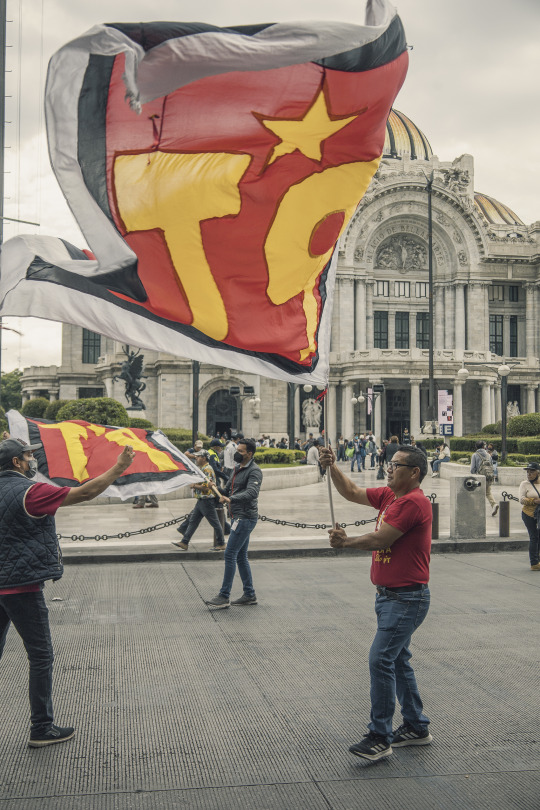
3 notes
·
View notes
Text
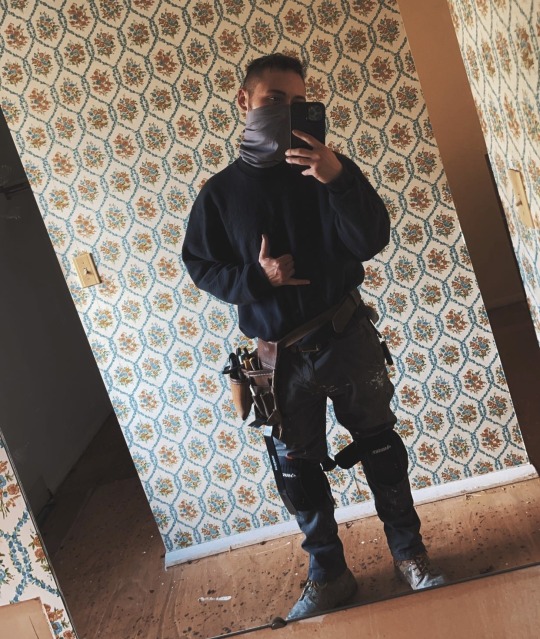
Blue Collar’d bastard ⚒️
#me#workers party#labor unions#laborer#blue collar#industrial revolution#capitalism#fascism#communism
1 note
·
View note
Text
youtube
Hey, anyone with the anti-imperialist left, this is how you buck the establishment parties.
Just when you thought he was done, he comes back.
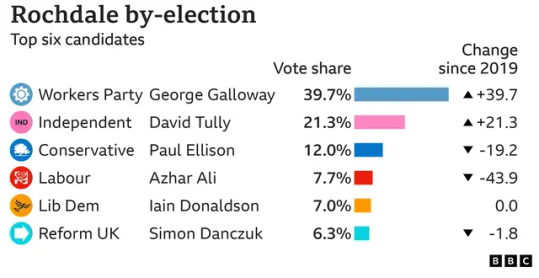
No social democrats on this side of the Atlantic are even half as strong as Galloway.
0 notes
Text
Hey Massachusetts socialists, Worker's Party of Massachusetts needs your help getting US Senate candidate Brandon James Griffin on the ballot to run against zionist war monger Elizabeth Warren.
Can you help out?
1 note
·
View note
Text
So now that our democrat controlled government is stripping rights away from us, just know you DON'T have to vote democrat.
In mass, there is a worker's party that is literally the perfect party for us gen z!
0 notes
Text
Wrong Number 4
Steve was eternally grateful that he'd finally told Robin about Eddie. Because now, he could torture her with his outfit choices. Robin groaned and covered her eyes as Steve held out more shirts.
"What do you think? Stripes or no stripes?"
"Steeeeeeve", Robin whined.
"You're the one that told me stripes really shows off my chest."
"Is Eddie a tits guy? Or an ass man?"
Steve put the shirts back in the closet. "I don't know. I don't know Robin and the fact that this is a video call date makes it worse."
"Actually....actually it makes it better." Robin uncovered her face and grabbed Steve's shoulders. "You'll be on the phone the whole time!"
"Yes...We've established this", Steve said, not sure where she was going with this.
"I mean, if you're doing a video call, YOU control what Eddie sees."
Steve stared at her face for a long while as she simply emoted using her eyebrows. "Robin, no."
"Robin, yes. Come on. We're going shopping. You're waaay overdue for this. And I need a couple of things myself."
"Things going that well with Chrissy?", Steve asked right before Robin threw his shoes at him.
"What do you think I'm doing while you're on your date?", Robin grinned.
-----------------------
Eddie's excitement just got more and more intense with each day. By Wednesday he was vibrating any time his hands weren't occupied with something. He only hoped it didn't translate to his texts. Cool as a cucumber, that was his motto when it came to Steve. He couldn't come on too strong.
(9:45 am) Thinking about those beefy thighs
(9:46 am) god i wanna wrap them around my head
Perfect. Smooth. And not too much.
At least he didn't think so at the time. About an hour later Eddie remembered that Steve was at work and possibly reading that text in a room full of prepubescents. And he knew he was going to reap what he sowed when Steve texted him later.
[12:01 pm] You are the ultimate distraction.
(12:02 pm) sry. i forgot you were at work
[12:03 pm] I don't think you are sorry. In fact, I think you need to be punished.
Eddie needed to get a job in coding because there was no emoji that properly conveyed the intensity of the 'boi-yoi-yoi-yoing' going on in his pants. How grateful he was that he didn't need to talk. Texting would cover any stuttering he was sure to do.
(12:04 pm) punishment? 😏
(12:04 pm) what kind of punishment?
[12:05 pm] See me after class, Mr. Munson.
God, four o'clock couldn't come fast enough. Eddie knew that'd be around the time Steve got home from work. He spent about an hour rolling around in bed before getting up, needing to distract himself. He wasn't due for work today, but he went in anyway to loiter.
"I can tell you're horny and I can tell you're just idling until you get your dick wet. Get lost, some of us have actual work to do", Jeff said.
Eddie let out a dramatic gasp. "Jeffery! Jeffords! Jeffaniel! Jeffanie!"
"Are you just going to sit there, making up full names for me or are you gonna get off your ass?"
"I'll replace all the boards and sweep out the alleys for the next two hours", Eddie said, holding his hands together like he was praying to his friend.
Jeff rubbed his chin as he considered it. "Only if you take this next party I have coming in."
Eddie looked at the group arriving. There had to be at least a dozen. And he just knew they only reserved one lane. They always only reserved one lane.
"You drive a hard bargain Jimothy."
"Not even close", Jeff crossed his arms. "And it's this or whatever ants in your pants you'll do if you're unoccupied."
Curse his friends for knowing him so well. Eddie held up his end of the deal, taking care of the party. Turned out it was a birthday party (happy 14th Ashton). But two hours later, the time had passed and Eddie went back home. He still had an hour to spare (he didn't want to leave Steve waiting), so he spent the rest of the time coming up with some ideas for their date in a few days.
[4:04 pm] Are you home?
(4:05 pm) At home and awaiting orders gorgeous
(4:05 pm) Have I been a bad boy Mr. Harrington?
Eddie's phone rang and he picked it up as he crashed onto his bed. He knew Steve could hear it when he laughed on the other end.
"You need to keep a tighter lid on those urges. It was a lucky break that all the kids were focused on their dishes that they didn't see the face I made."
"Truly, my bad Stevie. But I can't help what you do to me."
Steve chuckled. "Not even a little?"
"Not one bit. Okay, maybe a little bit. The truth is, I could've said a lot more, but I was holding back."
"Really now? And what would you have said if you weren't holding back?"
Eddie could hear something that sounded like movement in a bed. Steve was getting comfortable too. He thought about the picture he had saved, of Steve's lower body in those shorts. He had been laying in bed then too. Eddie let his mind wander for a bit. What he'd do if Steve were really in bed beside him...
"Baby if you were here right now, I'd have my hands all over you. You'd think I was an octopus."
"Tell me where you'd touch me first", Steve said.
"Well I'm still thinkin' of those legs of yours. You like massages, Stevie? I could rub you down all day."
Steve imagined Eddie digging his fingers into his muscles. That would really hit the spot, especially after a workout. "Mmm, and then?"
"And then I'd wrap them around my head, like I said. I saw what you were packin' in those shorts, baby. I would love to get my mouth on you."
Eddie heard Steve let out a soft moan and he definitely heard a zipper and some shifting. God, the image of Steve stroking himself... Eddie unzipped his pants too, palming at himself while the other hand kept an ever tightening hold on the phone.
"Eddieee..."
"I wanna hear everything, baby. I'm working so hard sucking you off, I deserve to know how good I'm making you feel."
"So good, uh", Steve let out a small breath at the end.
"Yeah? I haven't even told you how I'd rock your world yet", Eddie grinned.
"I just know...You're so good with your mouth."
"You like the way I lick you up and down? How I kiss that beautiful tip?" Eddie knew he had a dick just as handsome as the rest of him, never mind that he had yet to see Steve's whole face yet. His hand pumped up and down as he envisioned the weight of Steve in his mouth. He thought about getting drunk on that taste.
Eddie groaned and his eyes fluttered close, his mouth moving faster than his brain. "Do you shave Steve?"
"....No...is that a problem?"
"Ohh it's the opposite of a problem babe. I bet you got a thick bush. I'd sink all the way down, bury my nose in it while you're fucking my throat."
Steve let out the most delicious sound as he came and Eddie wasn't too far behind. It was like he was there, hairs coarse and curly rough against his skin while Steve moaned right into his ear.
"Mmm", Steve hummed. "I know you look good now. My cum dripping off your lips."
"I'd swallow it all, sweetness. I wouldn't waste a single drop." He would take all that Steve gave him and then some. He was a greedy man.
"I know you wouldn't. I don't allow anything to go to waste in my classroom. Have you learned your lesson, Mr. Munson?"
"Maaaybeee. I might need another lesson, Mr. Harrington. Say, this Friday, at eight?", Eddie teased.
"I suppose you'll need more help studying. Don't be late, mister."
-----------------------------
For once, Steve didn't linger after work. He made sure the kids cleaned up every last dish before the last period even ended. He even let them go a minute and a half before the bell. When Steve left, he went the back way to avoid most of the other teachers and that pre-weekend conversation. He got home right away and started getting ready. Robin had her own date tonight which meant he had limited time to get her help and last minute input.
When she got home from work, the apartment was a flurry of activity between them.
"Steve, I need the blow dryer!"
"Wait! I'm almost done!"
They both crashed into each other's spaces as they tried using the one bathroom mirror.
"Why can't you use your stupid vanity mirror?", Robin asked.
"That mirror is just for my hair and it's too small."
Robin gave him a side eye. "Is that my eyeliner?"
"Is that my face cream?"
For some reason, Robin insisted on getting dressed in his room, which meant at some points their outfits got switched around and they had to re-dress. The pandemonium finally quieted when Robin left for her date and Steve was at last alone for his. It was at 8:00 sharp that Eddie sent a text.
(8:00 pm) Knock knock 😙
Steve smiled as he started a video call. His heart fluttered at the thought of finally seeing Eddie's full face. So imagine his surprise when he was instead met with a hand that had a face drawn on it. And what could only be Eddie doing a deeper, character voice.
"Hello my love. Are you ready for the romancing tonight? I hope I get lucky, ehehehehe."
To which Steve couldn't help but burst out in laughter. Any nerves he might've had flew away.
"Oh, I don't know. I'm a proper young man. I don't think I could court with someone who was so...handsy."
"I wouldn't lay a finger on you without your permission, lovely. But maybe a few smooches. Muahmuahmuah!" Eddie's hand attacked his phone's camera with kisses and Steve giggled like it was actually touching him.
As his laughing fit subsided, only then did Eddie reveal his face. He took Steve's breath away. He was literally speechless and just stood there staring, which made Eddie start to squirm a little.
"You tryina turn me to stone, Medusa?", Eddie joked.
"Sorry!", Steve apologized when he realized he had been staring. "You just...you look really nice Eddie."
"You don't look too bad yourself, handsome", Eddie smiled.
That was putting it lightly. For the both of them really. Steve felt like he was talking to the perfect man. Eddie felt like Steve had walked right out of his wet dreams.
"So, what did you order?", Steve asked as he sat down at his table. He made sure his phone was angled that it only showed him from the waist up. Robin had the bright idea that since he could control what Eddie saw, he could wear whatever he wanted under the line of sight.
He was currently wearing a blue and white striped polo shirt. And beneath that, some lacy, navy blue panties. Maybe Eddie would find out, maybe he wouldn't. Steve had his phone on the table, propped up against some books.
"I ordered the Munson special. A grilled cheese with potato soup."
"Oh, that's a Munson special, hm?"
"Damn straight. Tomato soup is still a classic, but I'd die for a potato. What'd you get?"
"I have some leftover pasta that I just added some mushrooms too. Nothing too fancy."
"Unless it's one of those truffles", Eddie pointed out.
Steve rolled his eyes as he twirled his fork. "Truffles? On a teacher's salary?"
"Hey, you could be secretly rich."
"Oh if I win the lottery, there will be signs."
"Like 5th graders using authentic truffles", Eddie nodded to himself.
They kept talking throughout their dinner and then took each other to their sinks to wash the dishes together. Eddie talked more about his friends. Some of which he worked with and the band he was in. Steve wasn't super into metal, but he liked it enough to be interested in whatever Eddie did.
When they had talked about their date night and discussed their options, they decided on dinner and a movie. Once the dishes were cleaned, Steve took Eddie over to the living room and he sat down between the coffee table and propped him against another set of books as they both queued up the movie on their ends.
"You know it's been a really long time since I've seen this movie", Steve said. "I think I was literally a kid."
"There was a time when this was literally my religion", Eddie said as Quest for Camelot started to play.
Steve knew Eddie was into Dungeons & Dragons, so him being in love with a fantasy movie made total sense.
"Did you have a crush on Garrett when you were a kid?", Steve asked, later during the movie.
"'Did'? I'd still let him use that staff on me six ways to Sunday!"
Steve laughed and he was coming to realize he laughed with Eddie much more than any of his dates in a long while.
"I'm gonna go grab a drink", Steve said as he got up. He nearly asked Eddie if he wanted something. It really was like he was right there with him. Steve grabbed a soda and then came back, sitting down in his spot again when he saw Eddie's expression.
He was silent, which was rare.
His eyes were bulging out of his head and his hand was over his mouth.
Steve was about to ask what was wrong when Eddie's eyes flicked down and then Steve got it. He had stood up. In full view of his phone. And then turned to go into the kitchen.
Eddie had gotten a first rate view of his panties.
Part 6
Tag Team (CLOSED)
@anne-bennett-cosplayer @estrellami-1 @newtstabber @omletlove @ifyoudonlysurrender @rehfan @morganski-19 @corvidcantina @dragonmama76 @just-ladyme @tinyplanet95 @goodolefashionedloverboi @idoquitelikebread @kittydeadbones @manda-panda-monium @rhapsodyinalto @paintsplatteredandimperfect @keylime-green @ihavekidneys @samsoble @honorarybrit81 @swimmingbirdrunningrock @aizawa-emma @deleataecount @thesuninyaface @fromapayphone @justmeinadaze @hbyrde36 @queenie-ofthe-void @resident-gay-bitch @bestwifehaver @dangdirtydemons @ellietheasexylibrarian @perseus-notjackson @pyrohonk @holysteddie @cinnamon-mushroomabomination @mrsjellymunson @geekymagicalpotato @notaqueenakhaleesi
#apo writes#stranger things#fanfiction#steddie#platonic stobin#i fuckin hated it when parties would reserve one lane and then migrate to an empty one next to them#it meant i had to change that board sooner rather than later#changing the boards wasn't too hard#it was drawing the targets#which i couldn't do for shit#and if the target came out wrong you have to replace the board#which meant wasted wood#which was why even when i replaced the board i left it to a co-worker to draw the target#which was why i knew i couldn't work there for longer than a few months#okay tragic work back story over LOL
549 notes
·
View notes
Text
The Establishment
of a Stalinist System in China
From 'The Stalinist System' (1972)
Translated by Roy West
Chapter 1: The Nature of the Chinese Revolution: A New Socio-Economic System
I. The Bearers of the Chinese Revolution
II. Peasant Land Revolution
III. Big Capital and Nationalization
IV. The Rule of a Petty Bourgeois Economy and the Historical Tasks of the Revolutionary Government
I. The Bearers of the Chinese Revolution
The 1949 Chinese Revolution was, first of all, a victory for the peasant class in their thoroughly revolutionary struggle against the feudalistic landlord class. The peasant class in China dissolved feudalistic land ownership and established peasant land ownership. At the same time, through this revolutionary struggle, the imperialistic interests tied to, and living off of the rule of the feudalistic land owners also were swept away. In their revolutionary struggle, that is the revolutionary struggle to establish the foundation to make the development of commodity production and capitalistic production possible in China, the Chinese peasants battled against the ruling power of the bourgeoisie (comprador=bureaucratic bourgeoisie), and the revolution also swept their power away.
The peasants led this revolutionary struggle, and the Chinese Communist Party represented the interests of the revolutionary peasantry. Since Mao Tse-tung gained control of the leadership, the Communist Party was dependent on the peasantry in its struggles, and fought to protect the interests of the revolutionary peasantry against the bourgeois opportunists represented by the Kuomintang.
The Chinese working class was concentrated in cities in the coastal areas, but its power was extremely weak, and after the defeat at the beginning of the Chinese revolutionary movement (defeat of the Guangdong uprising) an independent class struggle became impossible. The Chinese working class didn't fight to rally an independent workers party, but rather struggled under the leadership of the Chinese Communist Party whose character as a revolutionary party of the peasantry was strengthened under the leadership of Mao and in fact developed into this type of political party. This was the unavoidable outcome of the situation in China at that time, as well as in the international communist movement under the rule of Stalin. The revolutionary movement in China was the opposite of that in Russia: the revolutionary struggle of the working class did not gain hegemony over the revolutionary struggle of the peasants, but rather, based on the struggle of the peasants which they led, the Chinese Communist Party also led the struggles of the working class.
The Chinese Revolution led by the revolutionary struggles of the peasantry resulted in the sweeping away of the landowning class and imperialistic interests, and in the process of this struggle the bourgeoisie represented in the Kuomintang were banished. This fundamental character of the Chinese Revolution determined new production relations in Revolutionary China, and the nature of its following development.
II. Peasant Land Revolution
The socio-economic content of the Chinese Revolution was first of all the dissolution of the feudalistic landlord system of land ownership and the redistribution of their land to the peasants. This land reform began in the liberated zones, and spread throughout the country by means of the Central Committee's 1946 "4 May Directive", the 10 October 1947 "Land Law Policy" , and the 30 June 1950 "Land Reform Law". By 1952 the reform had been fundamentally completed. From the beginning land reform in China was definitely not carried out along consistently principled lines. A zigzagging path was taken where, at times, the confiscation of land was baned in order to make them "work together" to fight againt Japan, or the protection of rich peasant's property was considered. However, the struggle of the peasants inevitably led towards the confiscation of the landlords' property and the redistribution of land to the peasants.
Concerning the relation of land ownership before the Revolution, the landlord system of ownership was still dominant, but in the process of the gradual penetration of commodity production, independent peasants and peasants heading towards capitalistic management (so-called "middle" or "rich" peasants) were already playing a certain role. Although there are no overall statistics concerning the national relations of land ownership in China, the relations of land ownership according to a 1934 survey can be seen in Chart 1. (Chart is not included in this translation)
According to this survey, the landlords only comprised 5% of the total number of households, but owned 50% of the area of cultivated land, whereas the poor peasants and farm workers comprised 70% of the total households, but only owned 17% of the cultivated land.
Further, even in the "New Liberated Zones" where a very belated land reform policy was carried out, according to a Chinese government survey the landlord class which included 3 to 5% of the population of a farm village owned between 30 to 50% of the land, and in a small number of districts they owned between 70 to 80%. By contrast, the poor farmers who comprised somewhere between 50 to 60% of the population only possessed around 5 to 15% of the land. Moreover, in addition to the production relations between the landlords and the poor peasants there were other examples, such as the rich peasants who comprised between 4 to 6% of the village population, or the middle peasants who made up between 20 to 30% of the population and possessed between 15 to 25% of the land. Finally there are the farm laborers who were employed by the rich peasants and others and who comprised about 5% of the population and possessed between 2 to 3% of the land. (The Agricultural Taxation System in Modern China; The Asian Economic Research Institute pp. 114-116)
The dominant class relations in Chinese villages before the revolution, as we have seen, was the relation between the landlords and the subordinate poor peasants who had almost no land and paid a large sum of rent on the landlord's land which they cultivated.
The landlord class did not cultivate the land it owned, but rather divided it into trifling plots of land which were cultivated for them by the peasants who didn't have any land (poor peasants). This tenant system accounted for up to 90% of the land possessed by the landlords. Tenant farmers in the southern provinces cultivated on average 7.8 mu (畝) (Mu was a unit of measurement in old China, 1 mu is about 667 m*m) per household, while in the northern provinces the average was 16.3 mu per household. The tenant rent was extremely high. There was a fixed rate or share renting system and for the most part it was payment in kind amounted to about 50 to 60% of the harvest. The peasants were serfs exploited by the feudalistic landowners. In addition to the large sum of rent payable in kind, they had to pay a large security fee, and were forced to perform hard labor.
The landlords entrusted the collection of rents to clerks, and spent their lives in the cities. "Even in their absence they were collecting 50% of the tenant rent (payable in kind), and on the other side through money lending and running business they were exploiting them doubly and trebly. Those of ability advanced in the government and became officials, while others became district heads." (Economic Theory of Modern China; pp. 36-7)
Starting from these production relations, the struggle of the Chinese peasants against the landlord class inevitably became a struggle to transfer the ownership of the farmland which they were cultivating from the landlords to themselves. The goal of the peasants' class struggle was to transform themselves from feudalistic serfs to independent peasants and the dissolution of feudalistic land ownership and the establishment of the division of land ownership among the peasants.
The "4 May Directive" of the Central Committee of the Communist Party reflected the demands of the peasantry, "(1) The land of middle peasants will not be infringed on; (2) In general the land of rich peasants will not be changed; (3) The lives of minor landlords will be considered; (4) Struggle against traitors, local tyrants, evil gentry, and bosses; (5) The equal distribution of land; (6) The security of the right of land ownership."(p. 145)
The October 1947 "Land Law Program" directed an even more thorough struggle against the landlords and rich peasants, "Based on the poor peasants and an alliance with the middle peasants abolish the exploitative system of the landlords and formerly rich peasants, their land and fortunes will not be any greater than that of the peasant mass". The radical distribution of land was carried out, "The requisitioned land will all be distributed equally among the entire native population irregardless of age or sex."
The June 1950 "Land Reform Law" resurrected the policies from the "4 May Directive". The land of rich peasants and the land property of cultivating landlords was protected. Through this "Land Reform Law" by the autumn of 1950 the land reform was put in place in the remaining liberated zones.
Along with the distribution of land, the peasants land struggle was at the same time carried out through the distribution of the landlord's agricultural tools and important means of production such as horses and cattle. In this way the landlord system of ownership was completely dismantled. With small land ownership as the foundation a small peasant economy became the dominant production relations for agriculture in China.
If we look at changes in the relations of land ownership in the farm villages in the newly liberated districts through the "Land Reform Law": the former landlords who comprised about 4% of the population owned only about 4% of the land. The former landlords share of the ownership decreased relative to its share of the population, going even below the average of the peasants land ownership. The rich peasants were also weakened. The rich peasant layer which made up about 5% of the population had only less than 10% of the ownership. Still, as before, this layer's land ownership exceeded the average for land possession. The middle peasants comprised between 20 to 40% of the population. The land ownership for this sector either barely changed at all or increased. The land they possessed totaled between 22% to 44%. The ratio of their population corresponded to the ratio of their land ownership. The poor peasants were the class to which most of the landlords' property was distributed. They comprised between 50 and 60% of the population and owned between 40 and 50% of the land. Land was also distributed to the former agricultural laborers who comprised about 5% of the population and owned about 5% of the total amount of land. Not only was the relation between the landlords and serfs abolished, the rural proletariat made up of agricultural laborers were also transformed into small land holders or self-sufficient peasants. If we look at the average land ownership of each class per person, we can see that the former landlord class average was 80 to 90% that of the total peasantry, the average for the rich peasants was 1.5 to 2 times that of the average, the middle peasants was about at the average or just over, while the average for the poorer peasants was at or below the average. Already the differences between each class essentially ceased to be such a decisive thing. Through the Chinese Revolution China was transformed into a country of small peasants, and an extremely egalitarian small peasant country at that.
The small peasants who were created through this land revolution carried out cultivation using extremely miniscale, individual or familial means of production. The extremely poor means of production owned by the average peasant were the following:
"The national average of cultivated land per peasant the equivalent of about 0.3 hectares, while the average for each peasant family was only about 0.94 hectares. In the south the scale was even more miniscale. The statistics for 1954 concerning the ownership of the means of production show that there was only one draft animal per peasant household, one plow per two households, and one water wheel for every ten households." (Theory of Socialist Economics p. 116)
The new production relations in the farm villages created through the Chinese Revolution, the small peasant economy based on the division of land, form a transition between the natural economy based on the feudalistic ownership of land and the overall development of capitalistic production, but is itself nothing but the product of semi-development of commodity production and capitalistic production. Marx wrote the following on the peasant division of land:
"Like the earlier forms, this form of land ownership presupposes that the agricultural population has a great numerical preponderance over the urban population, i.e. that even if the capitalist mode of production is dominant it is relatively little developed, so that the concentration of capitals is also confined to narrow limits in the other branches of production, and a fragmentation of capital prevails. By the nature of the case, a predominant part of the agricultural product must be consumed here by its producers, the peasants, as direct means of subsistence, with only the excess over and above this going into trade with the towns as a commodity." (Capital Volume 3; Penguin Classics pp. 940-41)
Even though the establishment of peasant land ownership achieved by the Chinese Revolution was an expression of the remarkable tardiness of commodity and capitalistic production in China, the creation of this peasant land ownership signifies a great historical development which established the foundation for the development of Chinese agriculture, and thus likewise the development of commodity production. Marx speaks of the historical meaning of peasant land ownership in the following way:
"The free ownership of the peasant who farms his land himself is evidently the most normal form of landed property for small scale cultivation, i.e. for a mode of production in which possession of the land is a condition for the worker's ownership over the product of his own labor, and in which, whether he is free or a dependent proprietor, the tiller always has to produce his means of subsistence himself, independently, as an isolated worker with his family. Ownership of land is just as necessary for the full development of this activity as is ownership of the instrument of labor for the free development of the handicraftsman's trade. It forms here the basis for the development of personal independence. It is a necessary transition point in the development of agriculture itself. (Ibid p. 943)
III. Big Capital and Nationalization
The peasant power established by the Chinese Revolution did not merely expropriate the feudalistic landowners. This power also expropriated and nationalized the capital of the imperialistic and bureaucratic bourgeoisie who had parasitically lived off China and exploited the peasants and workers. With the defeat of Japan and the end of the Second World War, the bourgeois Kuomingtang government confiscated some Japanese, German and Italian business, but after the Chinese Revolution starting with these businesses, all of the bureaucratic bourgeoisie's capital was confiscated.
By 1949 the revolutionary government had confiscated 2,858 industrial business, and the number of workers employed in these businesses had reached morethan 750,000. The nationalized economic system included 58% of electricity generated, 68% of the coal production, 92% of pig iron production, 97% of steel production, 68% of cement production, and 53% of cotton yarn. The nationalized economic system further controlled the national railways, the majority of modern transportation, transportation work, banks, commerce and almost all of the foreign trade. (Theory of Socialist Economy p. 114)
The revolutionary government also continued to requisition businesses owned by U.S. and British imperialist capital. At that time about one thousand businesses owned by foreign imperialists existed, but the majority of them belonged to U.S. and British monopoly capital. Directly after the revolution New China immediately took measures to do away with special privileges for foreign companies, and so these companies could no longer continue the arbitrary business activities of the past and the situation become nearly paralyzed. Therefore, some of the businesses applied with the government to close down, or voluntarily transferred or abandoned their operations, or were purchased by the Chinese government. The companies of both countries were either frozen or commandeered. In this way the foreign imperialist companies in China for the most part disappeared, while one part through nationalization formed the socialistic state-owned economic system." (ibid p. 115)
Thus the revolutionary government nationalized the large scale companies, but this small number of large companies stood on a foundation comprised of an enormous number of handicraft methods of production. Even though the large scale industries confiscated by the revolutionary government included the majority of the manufacturing and mining production in China, prior to the revolution these large scale industries had exploited the Chinese workers as imperialist capital, and the production was not based on the Chinese domestic market, but rather belonged to the economic sphere of foreign imperialism. This capital leeched off of China and was sucking huge profits from China for the sake of foreign imperialism. The products of this capital were mainly sent to foreign countries or were mutually traded between imperialist capital.
The Chinese domestic market, by contrast, was formed on the base of exchange between the handicraft capital which sprouted up naturally in the farming villages and provincial towns and the small peasants. The ratio of products becoming commodities was extremely low, and commodity production didn't break through local limits. Therefore, the accumulation of capital was on a remarkably small scale, and the "national capital" in China was extremely weak.
IV. The Rule of a Petty Bourgeois Economy and the Historical Tasks of the Revolutionary Government
At the time of the 1949 Revolution, industrial production in China totaled 14 billion Yuan; Out of this total, modern factory production was 7.9 billion Yuan, production in handicraft factories was 1.1 billion Yuan, and individual handicraft production totaled 3.2 billion Yuan. Moreover, looking at the management of companies: there were only 2,900 state run companies in comparison with a vast majority (1,113,000) of small scale privately run businesses. The workers working in state run factories amounted to roughly 1,500,000, while the workers in privately run factories was 1,600,000; for a total of only 3,100,000. By contrast, the number of individual craftsmen amounted to 5,800,000 (this figure is quoted from the Chinese Communist Party's Analysis of Economic Growth).
These figures show to what extent Revolutionary China was a country with a late development of capitalism. Pre-capitalistic handicraft manufacture made up an extremely large proportion of overall manufacturing production.
Commodity and capitalistic production had yet to reach society as a whole, and could only be seen in the state owned mining and manufacture companies and in some of the large scale privately managed enterprises. According to the June 1953 population survey, 86.74% of the population or 505 million people, lived as farmers. The city population was 13.25% of the total population which amounted to 77 million people. The ratio of agriculture to the overall national production was also extremely high. Out of the 1949 overall national production of 46.6 billion Yuan, agricultural production was about 70% or 32.6 billion Yuan, while manufacturing production was 30%, out of which close to 7% was handicraft production. The proportion of products which were commodities was also low. In 1950, out of an overall national production of 57.5 billion Yuan, commodity retail... amounted to 17.1 billion Yuan, and the commodity ratio was only 20%. The ratio of agricultural products becoming commodities was even lower. Peasants were carrying out self-sustaining production. Total agricultural production in 1952 was 48.4 billion Yuan. Out of this total, crops and stock breeding totaled 38.5 billion Yuan, while the remaining 9.9 billion Yuan was subsidiary production for personal use. Manufacture had not yet completely separated from agriculture, and the development of large industry could not even be seen. Peasant ownership of land and the accompanying agrarian domestic manufacture was dominant.
These economic relations were the starting point for revolutionary China. However, this is not such a strange thing. This is because the Chinese Revolution was not the product of the development of capitalistic production. Rather it was a nationalistic peasant and democratic revolution which completely destroyed feudalistic land ownership, broke the rule of foreign imperialism, and for the first time in Chinese history laid the foundation for the beginning of bourgeois development. We must start from a clear recognition of the class and historical meaning of the Chinese revolution. If we are dazzled by the ideology of revolutionary China embodied in Mao Tse-tung and his fantasy of peasant socialism, we will lose sight of the historical character of this revolution. We shouldn't use terms such as "new democratic revolution" or "proletariat revolution" to serve as a veil to obscure this revolution. We don't attempt to understand the Chinese Revolution through Maoism. Rather, when we understand Maoism by starting from the historical and class relationships in present day revolutionary China. In this way, we are able to grasp for the first time the real meaning of this revolution, as well as understanding why the fantasy of Maoism was necessarily created.
The bourgeois nature of the Chinese revolution is clearly expressed in the common program adopted at the first comprehensive meeting of the Chinese People's Government Entente Meeting of 29 September 1949. The first article of the common program states that the People's Republic of China "is opposed to imperialism, feudalism, and bureaucratism," and the state "will fight for Chinese independence, democracy, peace, wealth and power." The number one determining goal is to establish an independent national state and the unity of China through this state, as well as the wealth and power of this state.
The third article of the common program defines the tasks of the Chinese Revolution and the changes in property relations in the following way:
"the People's Republic of China will abolish all special privileges of imperialism, confiscate bureaucratic capital, shift ownership to the people's state, change from a feudalistic or semi-feudalistic system of land ownership to a peasant system of land ownership, protect public and cooperative property of the state, protect the economic interests and private property of the workers, peasants, petty bourgeoisie and national bourgeoisie, develop a people's economy of new democracy, and steadily change from an agricultural country into an industrial country."
Here the protection of private property is clearly declared. The ownership of land is converted to peasant ownership as a necessary point in the progress towards bourgeois development, and with private ownership as the foundation the capitalistic development from an agricultural to an industrial nation is proposed. Not only is there no mention of the working class struggle against capitalistic ownership, but as private property owners they are treated on the same level as peasants and the bourgeoisie.
In this document, revolutionary China's protection of private property is openly proclaimed, along with a clear declaration that the revolution established the foundation for the development of commodity and capitalistic production, and that the task of revolution hereafter would be to transform China into an industrial nation, in other words, the creation of capitalistic large scale industry.
The program also proclaims all of the bourgeois freedoms such as political freedom, an electoral system, sexual equality, and racial equality.
Another thing that should be noted is article 27, which states that land reform "is a necessary condition to develop the productive power to industrialize the country." We don't have space here to discuss the significance of land reform for China's capitalistic development.
As we have seen above, the Chinese Revolution gave birth to a colossal petty bourgeois economy. Almost the entire economy of the country had been based on individual and family labor. The revolution transformed the relations of ownership which corresponded with the developmental stage of this productive power and the character of labor, that is to the rule of private ownership based on one's own labor. From a historical perspective, the revolution for the first time established a united national state as well as creating the foundation for the development of the domestic market.
However, even though the revolution carried through changes in the relations of ownership which were a necessary condition for the development of commodity and capitalistic production, this alone could not realistically lead to their overall development. This is because private ownership based on one's own labor, in other words in this sense the agreement between production and ownership, had only just reached the beginning of commodity production-only the small amount which exceeded personal consumption little by little became commodities. Therefore this signifies that under the dominant relations of production were not commodity production, but the relations dominant under the previous natural economy.
The overall development of commodity production is only possible under capitalistic means of production, and capitalistic production is simply a product of the historical sublation of private ownership based a person's own labor. Capitalistic means of production are an indispensable pre-condition for commodity production, however the two are not identical.
The additional historical and social precondition for the development of capitalistic production is the concentration of the social means of production on one side, and free workers in the double sense that they are the free owners of their own labor power, as well as workers who have been freed (separated) from all of the important means of production, on the other side.
Seen from the perspective of the developmental stage of productive power, or the created production relations, there is little room to doubt that the development of revolutionary China merely made possible the development of capitalistic means of production. But for this purpose the historical separation of the direct producer from the means of production and the concentration and monopolization of the broken up means of production was necessary. But the development of the Chinese national economy from a small peasant economy could not have happened without opening the path to large scale capitalistic industry through the social concentration of the means of production. To promote this historical development, and create the historical conditions essential to the development of capitalistic production-these were the historical tasks for the revolutionary government in China.
To Contents
0 notes
Text
Yesterday on tankie twitter:
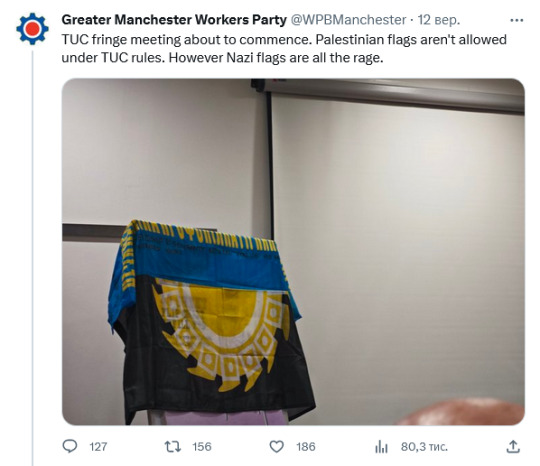
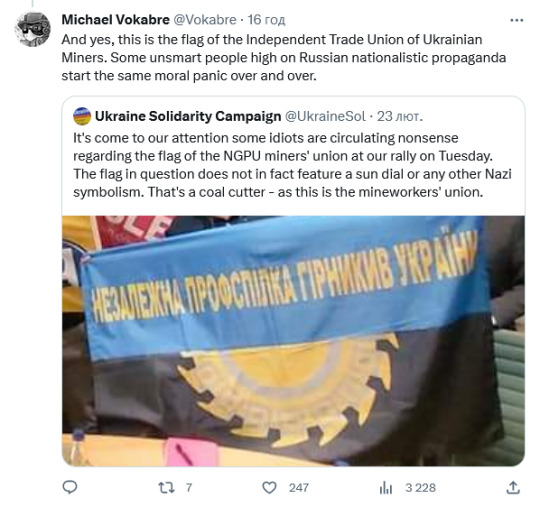
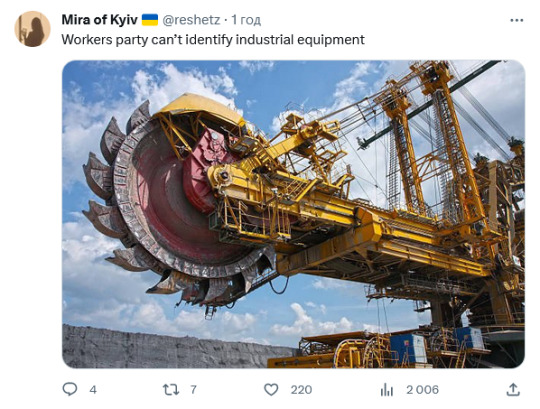
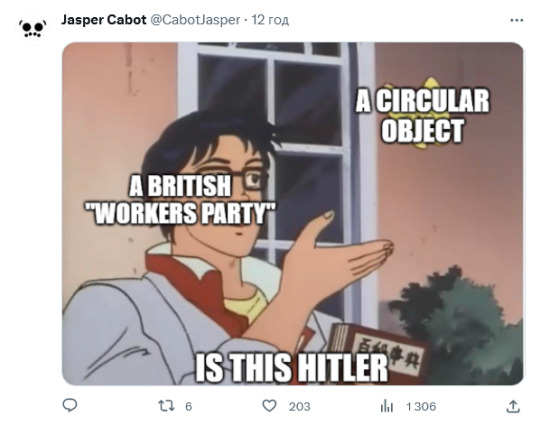
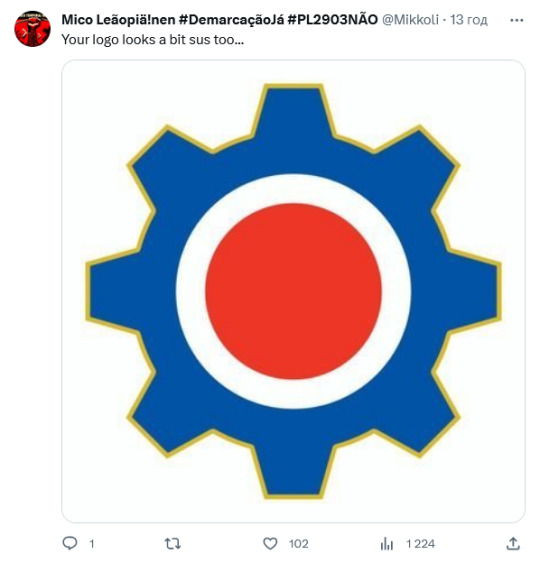
495 notes
·
View notes
Text
People on here are acting real weird about the Rochdale by-election as if they were watching it because there was some progressive alternative that they could've chose, and not because that it was a shitshow of clown cars driven by baboons that were bound to crash.
2 notes
·
View notes
Text

https://asf-iwa.org.au/
https://theanarchistlibrary.org/special/index
https://sequr.homes/
http://tutas.org.au/
https://wsfpakistan.pk/
https://www.twu.com.au/
https://www.amazonlaborunion.org/
https://libcom.org/
https://www.accc.gov.au/
https://www.splcenter.org/
https://www.auwu.org.au/
https://www.iww.org/
https://www.iwa-ait.org/
https://www.cnt-ait.org/
https://www.fairwork.gov.au/
https://unitedworkers.org.au/
https://www.australianunions.org.au/
https://audioanarchy.org/
https://www.akpress.org/
https://deathtofascism.com/files/40ways.online.2020.pdf
https://sbworkersunited.org/
#iww#industrial workers of the world#workers rights#amazon workers set to walk out for three days this weekend amid pay row#workers of the world unite#workers solidarity#workers#traditionalist worker party#worker solidarity#sex worker#construction worker#international workers day#worker#ausgov#politas#auspol#tasgov#taspol#australia#neoliberal capitalism#fuck neoliberals#anthony albanese#albanese government#antifa#antifascist#antinazis#antinazi#anti elon musk#antiauthoritarian#anticapitalism
514 notes
·
View notes